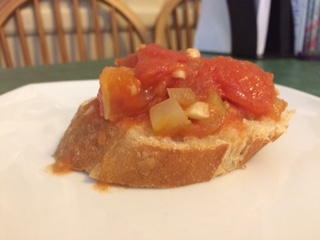Last year I spent a few days at a conference outside of Reggio Emilia in Italy, which was hosted by the very delightful Cucine del Popola in the tiny village of Massenzatico. At then end of the conference one of the women who work in the kitchen spoke to us about the aims and ideas of an anarchist cafe, and during the speech she said 'we honour Durrutti, but we honour Durrutti's cook more'. At the moment I think that's where I might be.
So on the night of 3rd of May 1968, Guy and Alice took part in the first disturbances of the events, and I thought, fifty years on, it would be a good place to start cooking the meal they later concocted in their Belgian exile. I dutifully cooked the recipe for Enraged Soup, mainly because I wanted to and also because I'd like to think that I'm not the first person to have cooked these dishes.
The recipe and method are as follows:
Brown the cut-up tomatoes in oil. Season (salt, pepper, Cayenne, garlic). Reduce. When the tomatoes are cooked, add three-quarters of a litre of water. Incorporate the bouquet garni. Simmer for 20 minutes.
Serve on the slabs, which have been crisped; add the creme fraiche.
What can I say? I'm not sure what I expected, maybe I wanted some magic, transformative thing to happen. Here, below, is the rather constructed photo of my efforts, in an attempt to show the paving stones, the enragement on top of them, but not the beach underneath.
I wasn't overwhelmed, or inspired or much else to be honest. I am an extremely romantic person, and I suppose I wanted something else, but I didn't get it. Just as there is no mention of when to put in the celery in the recipe, I forgot to put in the chervil, and I didn't put in the creme fraiche, as I think the world is a perfectly good place without it.
Next up is the Gay-Lussac Croustarde, accompanied with the note that Pierre Le Graveleur [i.e. Pierre Lepetit] 'is charged with creating it.' Since this was later cooked by the said Pierre, and it consisted of 'a splendid flaming lobster served on a bed of mussels and hot chesnuts' - dedicated 'to the glory of the barricades of the rue Guy-Lussac.' The night of the barricades, as the night of May 10th is known, involved an all-night battle, which can be read about in a contemporary account here.
I've never cooked lobster before, but I've been thinking about it, or mussels for that matter. The closest I have come to a lobster is in a French country market, when I was idly looking at the sign saying 'homard', and then realised the homard was waving his antennae at me. Thankfully the next homard will be frozen.


Comments
Post a Comment